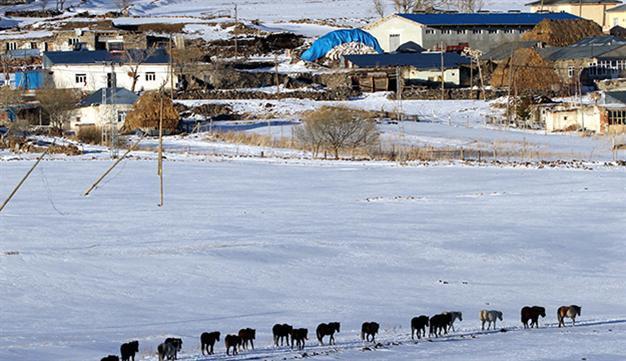IFAD-supported investment ‘improves quality of life of rural poor in Turkey’
ANKARA

AA Photo
Development projects in Turkey supported by the International Fund for Agricultural Development (IFAD) have helped improve the incomes and quality of life of the rural poor, according to the findings of an independent evaluation, which were presented on Jan. 28 in Ankara by the Independent Office of Evaluation of IFAD.The report points out that important achievement was made through rural infrastructure initiatives, which increased agricultural productivity and promoted commercialization, said the IFAD in a written statement.
In Turkey, agriculture is the second most important source of employment in rural areas and the largest employer of women.
The report highlights that the long-standing partnership between IFAD, an international financial institution and specialized agency of the United Nations, and the government of Turkey is strategically important to both.
“Beyond IFAD’s financing role, there has been demand for IFAD to be a more active player in sharing its technical expertise and international knowledge and experience, as a way to enrich the partnership, especially in implementing the 2030 Agenda for Sustainable Development in Turkey,” said the statement.
The largest IFAD-supported investment in the country has been in rural infrastructure, which includes building village roads and irrigation and improving markets and transport in several provinces in eastern Anatolia, including Ardahan, Artvin, Batman, Bingöl, Diyarbakır, Elazığ, Erzincan, Kars, Muş, Siirt and Sivas.
“At IFAD we know that our work to support rural woman and men to build better lives can only be improved by assessing our programs and projects in an independent and accountable way,” said Lakshmi Menon, Associate Vice-President of IFAD.
“These workshops allow us to reflect on the impact of our work in areas such as infrastructure development, agricultural productivity and access to markets, to pave a better path as we move forward.”
The portfolio of four projects evaluated demonstrated more modest achievements with other objectives, such as increasing rural employment and building and strengthening self-sustaining institutions of the rural poor, said the statement.
Despite continued government support, the report also found that the scope for sustainability of interventions was limited by weak operation and maintenance arrangements in infrastructure and insufficient collaboration with the rural financial sector, it added.
The current focus of targeting on an area basis is appropriate and needs to continue until poverty reduction is fully achieved in poor rural areas of the country. However, there is income disparity even within project areas, and projects that target “poverty pockets” need to be carefully designed and implemented to avoid capture of benefits by less-poor farmers.
“The IFAD partnership in Turkey needs to be strengthened and diversified, including co-financing opportunities with international and new Turkish partners such as Regional Development Administrations and the Turkish Cooperation and Coordination Agency on South-South Cooperation.” said Oscar A. Garcia, Director of the Independent Office of Evaluation.
“In particular, IFAD would benefit by engaging suitable private sector and non-governmental organizations that have relevant skills in such areas as participatory village mobilization, inclusive development, the environment and niche markets,” he added.
Over the last 30 years, IFAD has supported 10 projects in Turkey for a total of cost of $661.1 million, of which IFAD has provided $189 million. Activities have directly benefited 1.3 million households. The geographical focus has been on the economically lagging regions and provinces of the country.
















